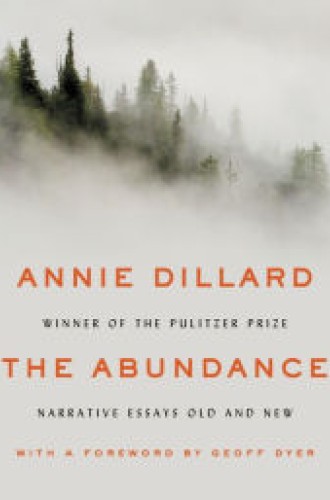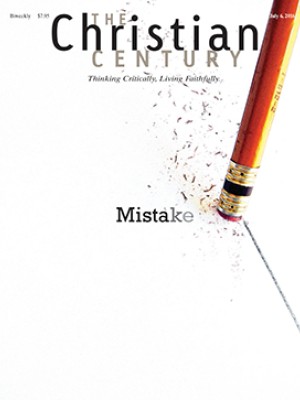Vibrant, vigorous, and weird
Here are some sentences to ponder about Annie Dillard. She may be the finest American essayist of our time. She wrote one of the five best memoirs I’ve ever read. She wrote one indisputable masterpiece, the Pulitzer Prize–winning Pilgrim at Tinker Creek, and perhaps another, For the Time Being (although I notice that people either adore or detest the latter, which is fascinating). She has published novels, poems, and books that defy easy labels, including Holy the Firm and Teaching a Stone to Talk.
Annie Dillard writes unlike any other writer who ever wrote. Isn’t that a remarkable sentence? But it’s true; and it’s part of what makes her one of the finest American writers ever. She is as riveting, piercing, startling, and lyrical a spiritual (and Christian, though she ducks the label) writer as I have ever read.
Read our latest issue or browse back issues.
She has also not published a new book in a decade, for whatever reason, which gives The Abundance a higher profile than a collection of selected essays generally might. This book is a miscellany that includes stunners, like “The Weasel”—as soaring and powerful a brief essay as there is—and lesser contemplations like pieces on Disneyland and the South Pole. Three selections are from Tinker Creek, four from Teaching a Stone to Talk, seven from her wonderful and often very funny memoir, An American Childhood. But the book as a whole suffers from the inherent vice of collections, which is to say an inconsistency of tone. The two essays included here that are not from her previously published books are slight things. A reader who has never read a word of Dillard might be better off plunging headlong into the sumptuous feast of Tinker Creek rather than picking at the appetizers in The Abundance.
That said, though, what savories here there be! Almost any page yields the precise puzzling haunting music of Dillard’s mind at work and reminds even a seasoned Dillard reader of the vibrancy and vigor and sheer weirdness, sometimes, of her prose. “I walk out,” she writes in Pilgrim at Tinker Creek, “I see something, some event I’d otherwise have missed and lost; or something sees me, some enormous power brushes me with its clean wing, and I resound like a beaten bell. . . . Something pummels us, something barely sheathed. Power broods and lights.” Or from her fine book about writing, The Writing Life: “Admire the world for never ending on you—as you would admire an opponent, without taking your eyes from him, or walking away.” Or the soaring prose poetry of Holy the Firm:
Every day is a god, each day is a god, and holiness holds forth. . . . This is the one world, bound to itself and exultant. . . . This is the one air, bitten by grackles. . . . The god of today is a boy, pagan and fernfoot. His power is enthusiasm; his innocence is mystery. He sockets into everything that is, and that right holy. Loud as music, filling the grasses and skies, his day spreads rising at home in a hundred senses. He rises, new and surrounding. He is everything, that is, wholly here and emptied—flung, and flowing, sowing, unseen, and flown.
Something there is, as you see, in Dillard’s best wildest most piercing passages that punches down as deeply into spiritual truth as Gerard Manley Hopkins’s lurching poems, or Andre Dubus’s blunt essays, or Frederick Buechner’s visionary humble passages.
“Dillard opens our eyes to the world, and to new ways of articulating what we see,” writes Geoff Dyer in his foreword to this collection. That is a pithy explanation of, and subtle compliment for, Dillard’s remarkable work. She is always, always chasing after the Creator, the Imagination, the Speaker of the Word, the “chief Musician” of the Psalms, as revealed in the miracle of this world and its denizens. She has done so, book after book, with a poet’s ear and essayist’s loose chatty flow. She sometimes pushes her search and her sentences so hard that they don’t make complete sense; but when I read her, and startle or stumble over a line or passage, I remember that faith itself makes no sense, that truth is bigger and deeper than sense and reason and logic and knowledge, and that a fervid furious relentless heated curiosity is a wonderful thing in anyone, especially someone who records her fervent ardent search with such lyricism.
Is Annie Dillard a poet? Yes. An essayist? Yes, at her best as great as the terrific Edward Hoagland. A mystic? Yes, at her best as riveting as Thomas Merton and Simone Weil. Is The Abundance her best book? No. But it is a decent place to start, if you have not read any Dillard, and a good place to visit, if you have not been in the wonder-forest of her prose for a long time. In either case you will, I predict, be amazed by some of the inky music captured here, and then reach for Pilgrim at Tinker Creek or Holy the Firm, and be absorbed by one of the finest American writers ever. Quite a title, that—but she deserves it.







